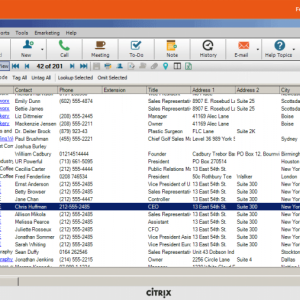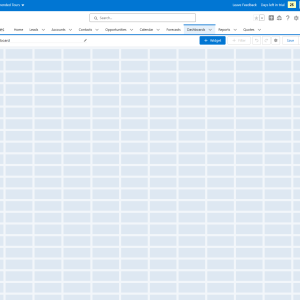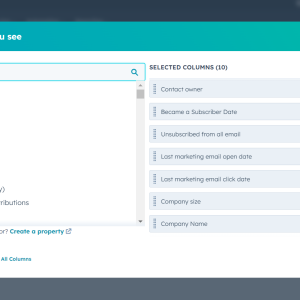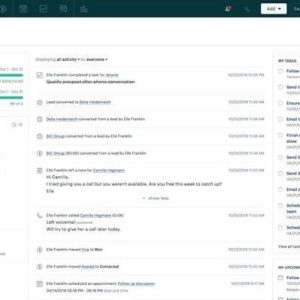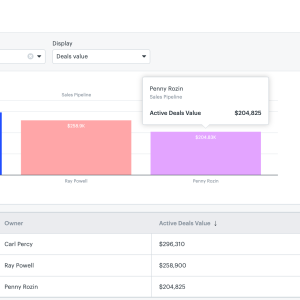In today’s fast-paced business world, effective customer relationship management (CRM) is essential for companies looking to thrive and exceed customer expectations. One CRM platform that has gained significant attention and praise is monday.com CRM. With its user-friendly interface, robust features, and customizable workflows, monday.com CRM offers businesses a seamless solution to manage their customer interactions and improve productivity. In this review, we will explore the key features and benefits of monday.com CRM, its ease of use, and how it can help businesses streamline their CRM processes for optimal results. Whether you are a small startup or a large enterprise, monday.com CRM may just be the solution you need to take your customer relationships to the next level.
Our research found that monday CRM is one of the best options available for customization, offering a simple, intuitive interface that allows for tailor-made designs to manage your business needs.
You are viewing: monday.com CRM Review
As a complete and fully functional Sales CRM, monday.com is easy to navigate, while still providing you with the excellent analytics and plenty of features to keep track of your business’s affairs. What’s more, the provider also has a number of discounts and deals for you to take advantage of.
In this monday CRM review, we cover everything from features and prices to customer support options and CRM alternatives, so you can make the right decision for your business. Plus, you can always compare providers with our handy CRM comparison guide.
In this review:
Not sure about monday.com? Check out some of our recommendations for the best CRM software alternatives, below. Otherwise, keep scrolling for our full monday.com CRM review.
monday CRM Plans and Pricing
monday.com CRM offers three different pricing plans: Basic, Standard, and Pro. Each one gives users access to unlimited boards, over 20 column types, embedded forms, the mobile app for Android and iOS devices, and the Kanban visualization that monday.com is known for.
All of monday.com’s CRM plans are available with a 14-day free trial, but there is no longer a permanently-free option for businesses, after monday.com discontinued its Individual CRM plan in 2022. If you’re a student or a nonprofit, you may be able to access a free or discounted version, however, “after filling out the relevant forms”, according to monday.com’s FAQ section.
monday.com offers its business CRM plans based on the number of users, and its pricing page offers a handy tool for figuring out exactly how much the CRM will cost depending on how many users you have. As for the specific prices:
- The Basic plan starts at $10 per user per month, billed annually
- The Standard plan starts at $14 per user per month, billed annually
- The Pro plan starts at $24 per user per month, billed annually
Here’s a table to give you a quick look at all the plans. But whatever you do, don’t forget that three-user minimum across all the paid plans. So, the respective plans realistically cost from $30 per month, $42 per month, and $72 per month, because you won’t be able to start with just one user.
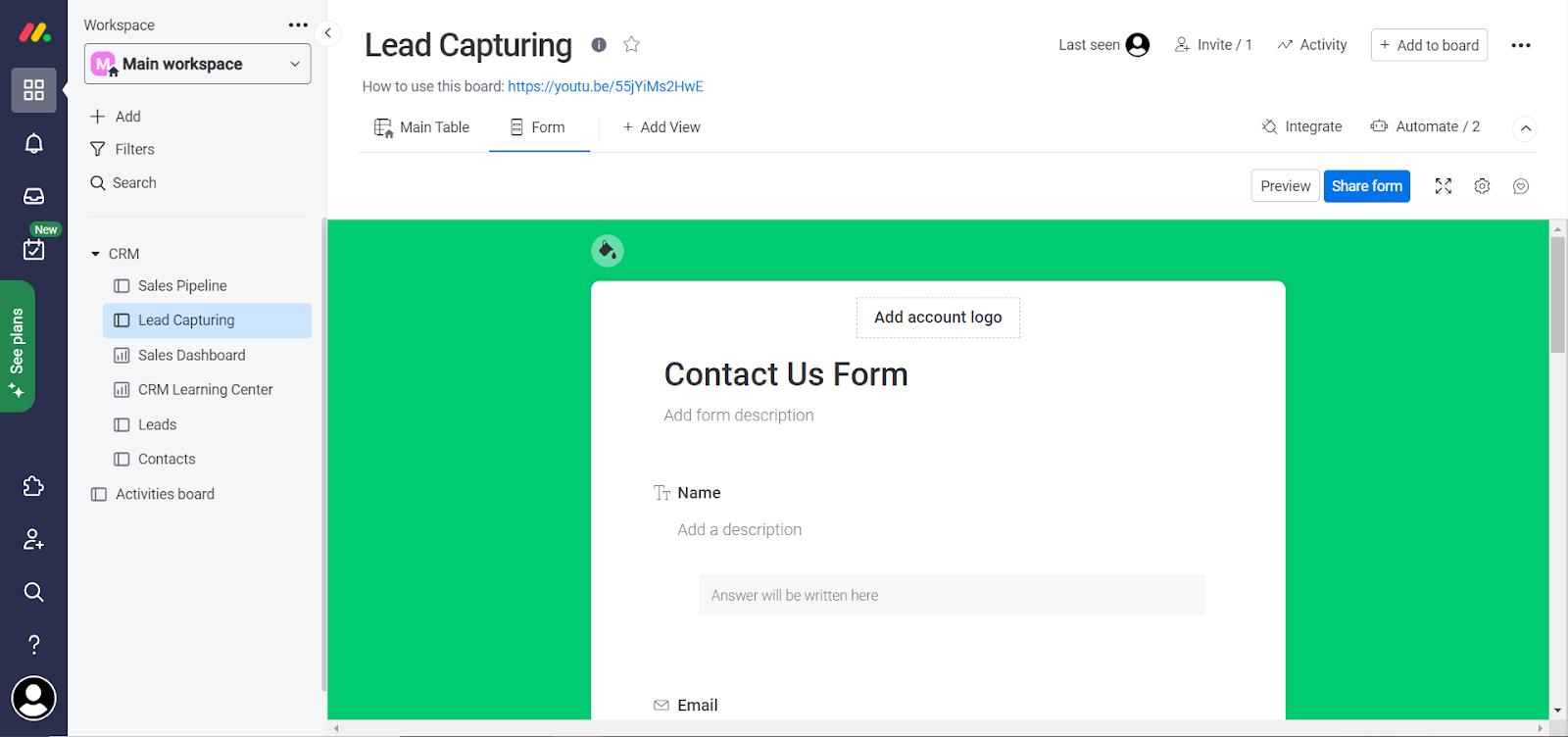
Web form lead capturing with monday CRM
Image: Hiddenshard testing
Basic plan — starting at $10 per user per month
- Unlimited free viewers
- Unlimited items
- Prioritized customer support
- File storage: 5 GB
- Dashboard based on 1 board
Basic is best for small teams that need a simple task-management solution that they can all access. Try doing too much, and you’ll bump up against its limitations, like the 5 GB cap on files and the one-board dashboard. This plan also offers lead capturing functionality through web forms, which you can see from the screenshot above.
Standard plan — starting at $14 per user per month
- Everything in Basic
- Timeline & Gantt views
- Calendar view
- Guest access
- Automations: 250 actions/mo
- Integrations: 250 actions/mo
- File storage: 20 GB
- Dashboard based on 5 boards
Standard offers more customizability, thanks to additional views, a 5-board dashboard, and support for automations and integrations. Guest access is another big perk, as it allows teams to collaborate externally. As your business grows, Standard is the easiest way to craft a workflow to fit your specific needs. Take a look at what else monday.com can offer your business.
Pro plan — starting at $24 per user per month
- Everything in Standard
-
Private boards
-
Chart view
-
Time tracking
-
Formula column
-
Automations: 25,000 actions/mo
-
Integrations: 25,000 actions/mo
- File storage: 100 GB
- Dashboard based on 10 boards
See more : Salesforce vs Microsoft Dynamics – CRM Platforms Compared 2023
Pro is for large operations that can’t afford to be as tight-knit as they once were: New tools like time tracking and private boards make sense for a sprawling team, as they’re designed to help managers keep an eye on team members who might otherwise slip through the cracks. Plus, storage, dashboards, automations, and integrations are all expanded far more than ever in order to support a heavier total workload.
Enterprise plan for 40+ users
- Enterprise-grade security
- Advanced reporting and analytics
- Multi-level permissions
- Tailored onboarding
- Premium support
- Enterprise-scale Automations & Integrations
- File storage: 1,000 GB
- Dashboard based on 50 boards
In addition to these three plans, monday.com offers an Enterprise plan, which includes a wide range of additional features that can be necessary for specific businesses. Add-ons like HIPAA compliance, audit logs, and tailored onboarding can be incredibly helpful, but only if you’re a larger company that can afford the presumably larger cost. To get specific pricing, you’ll have to contact monday.com directly.
Core monday.com CRM Features
monday.com is all about what you can add to your boards, and the software offers some incredibly helpful features that will make tracking your business easier than ever.
Workload
With the Workload board, monday.com will let users track and manage employee assignments in real time. The simple, color-coordinated dashboard displays each worker in a list, along with their projects in a row with them. You can see in a simple snapshot exactly who has finished what, who is currently working on a project, and which assignments are yet to begin.
The Workload board also features daily, weekly, monthly, and yearly calendars, so you can get a clear picture of what’s going on today or even next year. Plus, with the easy drag-and-drop functionality, you’ll be able to adjust deadlines and assignments with ease to avoid any miscommunications.
Timeline
If you’re looking for an even more detailed view of what projects are due in a given timeframe, the Timeline board is built for you. This allows you to specifically plan out exactly when deliverables should be met, and who should be delivering them. If Workload is the project-based board, Timeline is the chronology-based board, giving you specific timings for when everything will be developed.
Charts
Analytical reporting is key when it comes to taking full advantage of CRM software, and monday.com passes with flying colors… literally. The color-coordinated graphs can keep you posted on project progress, budget numbers, working tickets, and even time tracking for employees. And they look pretty good, too!
Integrations
All-in-one solutions just make life easier for everyone, particularly in the business world. monday.com is fully aware of this, which is why it offers a wide range of integrations with popular business software. Slack, Gmail, HubSpot, Mailchimp, and more than 50 other services can be easily integrated into the CRM, so you can truly control everything from one hub.
Setup and Customer Support
When it comes to customer setup and support, monday.com is all about providing you with the tools you need to figure things out yourself. The provider’s help page is filled to the rafters with online documentation, webinar links, video tutorials, frequently asked question lists, and step-by-step guides for users to take customer support into their own hands.
Unfortunately, it doesn’t look like monday.com is too easy to reach over the phone, though. No live chat option appears to be readily available on the website, and every “Contact” button available leads to a variety of embedded forms. Still, these forms lead to eventual communication with support representatives, and the wealth of online resources definitely makes up for the lack of readily available live options.
Also, it’s worth noting that, while monday.com is based in Tel Aviv, the company does have a New York office, so you should be able to get in touch with someone if you have to.

CRM templates from monday CRM
Image: Hiddenshard testing
Getting Started with monday CRM
You start off by choosing between a variety of templates, or “boards,” which are shown in the screenshot above. Each measures a different set of business metrics, from active leads to contact forms. You’ll be able to add code-less automation capabilities right into these boards, so your processes will already be saving you time.
See more : Best Lead Management Software 2023
Once you’re set up with your template, you can customize even more by dragging and dropping dashboards, lists, and other analytic and productivity tools into and around your template, helping you create the ultimate central hub for your business. You can even create and package custom apps along with monday.com, although that system is currently in beta, so there might be a few glitches early on.
monday.com vs Zoho CRM
Top to bottom, Zoho CRM is just the best CRM for small businesses. It isn’t too expensive, it’s easy to use, and it offers features covering sales, service, and marketing, which puts it far ahead of many options out there.
Compared to monday.com, Zoho CRM has a bit more standardized experience. It’s obviously not as customizable as monday.com, but it makes up for it with a lot of features for virtually any type of business. Plus, with more support options, you can get used to the platform a lot faster.
monday.com vs Freshsales Suite
If you can do without the customer service aspect of CRM software, Freshsales Suite is your best option as a small business. Great functionality in an easy-to-use package, which makes for a swift learning curve and improved productivity.
Again, compared to monday.com, it’s just easier to use and still more functional. While both are full-fledged sales CRM options, Freshsales makes it easier to get a full picture of your sales insights, even if it isn’t as customizable as monday.com. Plus, it has the better support options, so you can figure out any problems easily.
monday.com vs Other CRMs
We’ve done a lot of research on the best CRMs for small business, which is why we know that there are plenty of platforms out there if none of the other three pique your interest. Take a look at the table below to get a better idea of what your options are when it comes to CRM software.
About Our Research
For the record, we didn’t just decide that monday CRM was an excellent choice for businesses that need a customizable sales CRM. In fact, all of our business software recommendations are backed up by hours of in-depth research performed by a team of dedicated professionals utilizing free trials and feature catalogs to learn as much as possible about the nitty gritty details of these platforms.
For CRM specifically, our research team looked at some important metrics, including price, features, customizability, scalability, and help and support. On top of that, our team provided all of the unique screenshots of the monday CRM platform found throughout this guide.
If you want to learn more about our process, feel free to take a look at our research guide for a peak behind the curtain of our in-depth analysis.
Compared to other CRM providers, monday.com boasts substantial customizability as a software. The color-coordinated boards allow you to mix and match a wide range of metrics, so you can get what you want out of the software. In our research, we didn’t find any CRM as fundamentally customizable as monday.com – and that’s the main difference.
That’s a wrap on “ monday.com CRM Review ” We hope you’ve found a trove of useful insights and fresh perspectives. Your opinions and ideas matter to us—join the conversation below and share your take! Hungry for more tech insights? Dive into our diverse collection of articles where innovation meets practicality. Discover More CRM Softwares.
Stay in the loop with the latest in AI and tech – your journey into the digital future continues at hiddenshard.com.
#monday.com #CRM #Review
Source: https://hiddenshard.com
Category: CRM
